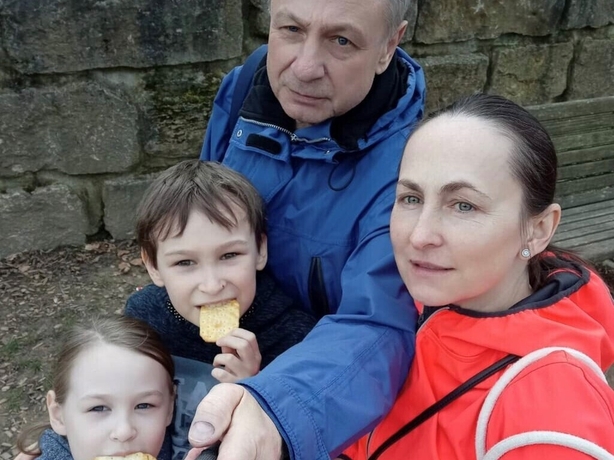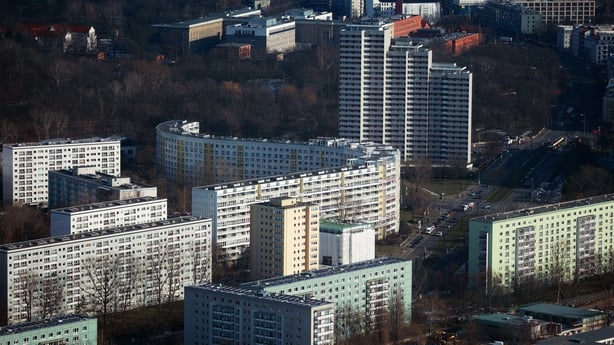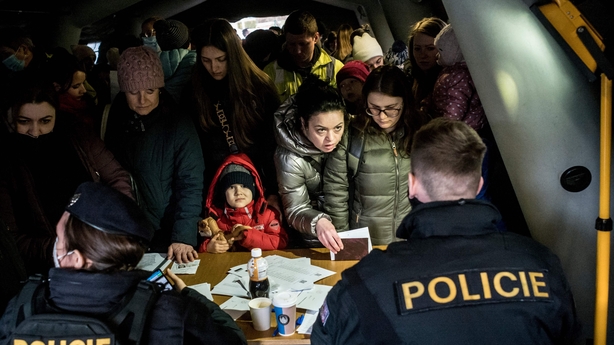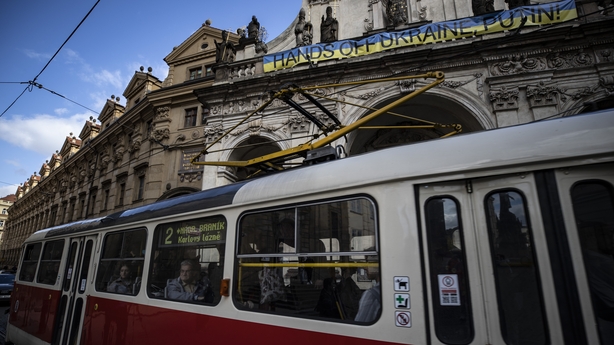"Our living conditions are good. There is heating, electricity, household appliances. The social service helps with paperwork," Natalia Shmatkova, a Ukrainian refugee who arrived in Germany four weeks ago, told RTÉ News.
Natalia spoke to RTÉ News previously in February when she, her husband Dmitri Kobalinsky and two children Ivan and Anna had just crossed the border into Poland, after leaving Kyiv.
Four weeks later, the family are now living in Künzelsau, a city of 75,000 residents in southern Germany.
From Poland, the family travelled by train to Hamburg and then on to Stuttgart where they stayed for two weeks in a refugee centre. In early March, they and three other families were moved by state services to shared accommodation in Künzelsau.
"We have one big room. It is temporary housing for six months. The next step should be housing – separate rooms for children, separate for parents," wrote Ms Shmatkova by text message.
The family currently lives in a state-run dormitory facility where residents share a kitchen and communal areas.

Ivan and Anna, now live in Künzelsau, southern Germany
A spokesperson for Künzelsau City Council told RTÉ News that it currently provides accommodation for "around 300 refugees" in the city.
Like Ireland, a number of central and eastern European countries are struggling to find enough accommodation to house refugees fleeing the war in Ukraine.
More one million Ukrainian refugees have registered for temporary protection in Germany since the start of the war – the second highest number in the European Union after Poland, where 1.5 million Ukrainian refugees now live.
Almost three-quarters of Germany's new Ukrainian residents live in rented flats and houses according to an extensive study published in December by the Federal Institute for Population Research (BiB).
The same study found that 17% are housed in hotels and 9% in refugee centres.
Demand for housing in Germany, like Ireland, is outstripping supply. The German Property Federation (ZIA) puts the supply of new units at a 20-year low.
This, coupled with rising rental prices in big cities has created a scarcity of available private accommodation for Ukrainian refugees.
According to a report published earlier this month by JLL, a global real estate firm, rental costs in Berlin increased by 15.5% year-on-year to February – the highest increase of any German city.
On average, rental prices in the country’s eight largest cities increased by 6% over the past 12 months.

Germany's Federal Government has looked to work with the private sector to find additional accommodation.
Next week, the Federal Ministry of the Interior and Community will launch an initiative with Wunderflats, a property rental platform, to provide subsidised private housing for Ukrainian refugees. Landlords across the country will be able to advertise their properties to Ukrainian refugees via the site.
On the Federal Government’s 'Germany4Ukraine’ website, which provides information for Ukrainian refugees, an animated video encourages new arrivals to consider living in smaller towns and rural communities, emphasising the current lack of housing supply in large cities.
Germany’s federal system means that individual states oversee responsibility for reception facilities and housing costs.
Ms Shmatkova and Mr Kobalinksy receive an allowance of €2,200 per month from the local state authority. The cost of their accommodation – €780 per month for a couple with two children – is deducted, leaving the family with €1,420 for the month.
Other countries in the region are curbing the amount of time that refugees can stay in state-funded shared accommodation.
In Poland, a new law introduced earlier this month, means that Ukrainian refugees, who have spent more than 120 days in state-run collective shelters will have to pay 50% of their accommodation costs. That amounts to 40 Polish zloty per day (about €10).
For refugees who remain in collective shelters beyond 180 days, the fee rises to 75% of the daily cost of accommodation.
Approximately 80,000 Ukrainian refugees currently reside in collective state-run accommodation in Poland.
In the Czech Republic, a similar law will come into force on 1 April.
Beyond that date, Ukrainian refugees will be entitled to a maximum of 150 days of state-funded accommodation.
The Czech Republic is now home to about 450,000 Ukrainian refugees, accounting for 4.7% of the population. Estonia, however, has the highest number of Ukrainian refugees per capita, making up 5% of its population today, according to UNHCR data.

One year on, Ukrainians account for almost 5% of the Czech Republic's population
"The system of housing support for refugees is currently undergoing a transformation," Klara Boumova, policy and advocacy officer for Caritas Czech Republic, told RTÉ News.
She said that the aim is to "support a transition to standard housing", so that those who can work will be able to pay for housing themselves.
The state provides an allowance of 5,000 Czech koruna per month to Ukrainian adult refugees (about €210) for their first 150 days in the country. After that, the sum is reduced by one-third.
An estimated 68,000 Ukrainian refugees currently in the Czech Republic will have stayed longer than 150 days in state-funded housing by the end of this month, meaning they will have to find alternative accommodation.
On Thursday, the Czech cabinet voted to extend a "solidarity allowance" of 3,000 Czech koruna per month (about €130) to families who host a Ukrainian refugee. The allowance stretches to 9,000 koruna for families that host three refugees.
However, fewer Czech households are now hosting refugees than during the first few months of the war. In fact, four in ten Ukrainians now live in non-residential accommodation such hotels and guesthouses.

Finding work
More than half of "economically active" Ukrainian refugees living in the Czech Republic are working, according to a study published in December 2022 by PAQ, a Prague-based research firm.
This compares to 17% of Ukrainian refugees who are working in Germany, a surprisingly low figure considering that seven in ten Ukrainian refugees who have arrived in Germany hold a university degree.
Getting recognition for a qualification from a non-EU country can be a slow process in Germany, Panu Poutvaara, a professor of economics at the University of Munich, told RTÉ News.
"Qualified nurses can wait from two months to one year for their qualifications to be recognised. It varies from state to state. Germany needs to work faster to evaluate and recognise the qualification of highly skilled workers," says Prof Poutvaara, who specialises in the economics of migration.
Language is also key to landing better-paid jobs and, in turn, affording housing costs.
The same study by Czech research firm PAQ found that Ukrainians who had arrived in the Czech Republic in spring 2022, had improved their ability to communicate in Czech two-fold. Those who speak Czech end up finding higher-paid jobs.
In Germany, only 5% of Ukrainians spoke German upon arrival, according to the BiB federal study. That figure should ramp up in the coming year as half of all respondents said they were now enrolled in German language courses.
The relationship between language proficiency and employment appears to be ubiquitous.
In Ireland, the CSO found that 70% of Ukrainians who attended employment support services (about 20,000 people) said that they felt their lack of proficiency in English was a barrier to getting a job.
In Künzelsau, southern Germany, Ms Shmatkova and Mr Kobalisnky have applied to enroll their two children, Ivan (11) and Anna (9), in a local school. Ms Shmatkova said they should receive school places within the next two weeks.
For now, the children continue to study the Ukrainian syllabus online with their old-school friends in Kyiv.
The whole family attends German language classes at an integration centre which is taught by volunteers.
"There are no basic [language] courses from the job centre yet. You have to wait a month or two. We were put in a queue for these courses. Many applicants but few teachers and classes," said Ms Shmatkova, who previously worked as an archivist at a state television broadcaster in Kyiv.
In Germany, more than one-third of Ukrainians say they plan to settle permanently in the country, according to the BiB study.
"If we find a job, we will pay for housing on our own," said Ms Shmatkova.







